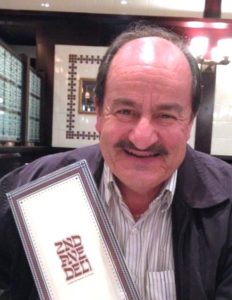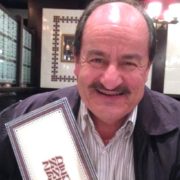Menorah, sukkah, and nu, grandchildren
 This is one of a series of articles I wrote for the monthly Bulletin of Peninsula Temple Sholom in Burlingame, Calif.
This is one of a series of articles I wrote for the monthly Bulletin of Peninsula Temple Sholom in Burlingame, Calif.
Sandy Silverstein is a mensch. That’s what I thought, upon meeting him via Skype in early January 2012, and in person in Westport, Connecticut, later that month. Sandy oozes professionalism, competency, and yiddishkeit, which are vital characteristics of a synagogue executive director. Sandy is also spiritual, and frequently reminds me that our decisions should always be based on Jewish values rooted in Jewish text, including the Torah and Talmud.
Sandy and his wife, Meryl, moved to our community at the end of June, and he began working at PTS on July 1. Collaborating with Sandy on a near-daily basis is one of the joys of my term as congregational president.
While Sandy has met and talked to many PTS congregants, seven months isn’t close to enough time to meet everyone. To jump-start that process, let’s find out what makes Sandy tick.
Alan: Sandy, please tell us about your family — Meryl, the boys, pets… and of course, grandchildren.
Sandy: Meryl and I have been married for 37 years. We are living in San Mateo, where Meryl is now an active volunteer at the local high school as well as at PTS. We are the parents of two wonderful sons, Stephen and Howard.
Stephen is Assistant Professor in Spanish at Baylor university in Waco, Texas, and he is engaged to Alla Aksel, who is completing her Ph.D. in electrical engineering. Alla works for Northrop Grumman, a defense contractor. The wedding will be this summer!
Howard is married to Jess. They both work for the State of New York, and make their home near Albany. They are the parents of our two adorable grandchildren, miles (almost 3 years old) and Skylar (8 months old).
Our home would not be complete without our Irish Setter, Scarlette. She is a “rescue.” All of our dogs have been rescues. meryl used to foster dogs waiting for adoption.
Alan: You are a native of St. Paul, Minnesota, who spent many years living in New England. As you settle into the Bay Area, what has surprised you about life Out West?
Sandy: When I arrived for my first day of work last July, I was firmly admonished, “Sandy, we don’t wear ties!” I learned quickly that what is considered dress-down on the East Coast is business casual on the Peninsula.
Alan: Other than our Family Shabbat dinners and Judaica Shop, where are your favorite places to hang out, shop, and eat?
Sandy: We are still exploring the Peninsula and the Bay Area. We do not hesitate going into the City with our out-of-town visitors, though the traffic is always a challenge. We have found a few favorite restaurants, like on Laurel Ave. in San Carlos, but are always up to trying new things.
We even went to Livermore for wine tasting!
Alan: When you visited our Temple for the first time, what impressed you most?
Sandy: I could not get over the beauty of the Sanctuary. Truly stunning.
Alan: You brought us a new sukkah and installed the new outdoor chanukiyah above the school entrance. Tell us about those beautiful additions.
Sandy: I bring a fresh set of eyes to look at past practices, to see what new things I can bring to my work and to the congregation. The opportunity to showcase our holidays to everyone who comes to our Temple is one of the reasons we built a new sukkah and installed the beautiful 9-foot chanukiyah on top of the school.
A congregant overheard a preschooler exclaiming to her mother in the parking lot, “Look — there are three more nights to Chanukah!?” The child had counted the unlit candles remaining. Perfect.
My background allows me to suggest such innovations. Stay tuned. There are more to come!
Alan: When you brag to your friends Back East about your new spiritual home, what do you talk about?
Sandy: You can guess — the weather! Also that PTS only does a single bar/bat mitzvah on a Saturday morning, instead of doubling them up.
Alan: As we move into the spring, what’s on top of your PTS to-do list?
Sandy: The biggest item is the annual operating budget. The budget is an expression of both our vision and values. Working with lay leaders and senior staff to create the budget is a major undertaking each year — but well worth the time and effort. The result is a wonderful year of well-attended programs, holidays, worship, learning, and community.
Alan: You like to get to know members and their families. What’s the best way for them to meet you?
Sandy: I hope people will come by and see me in the office. Free coffee, free conversation — what could be better?


